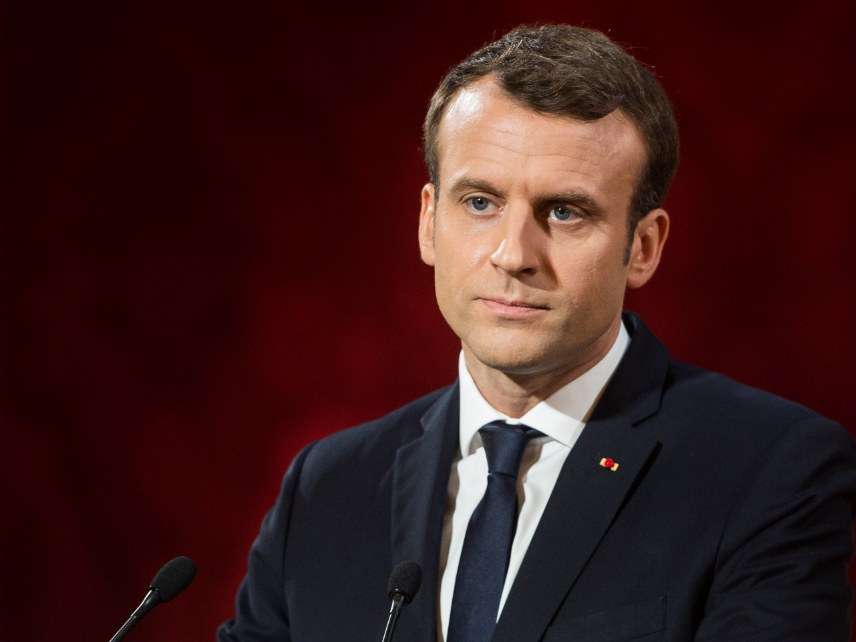Warning: The President Wants to Censor 'Fake News'! The President of France
Politicians cast attacks on them as attacks on democracy. How self-serving.

President Donald Trump is commanding a lot of attention for his lawyers' attempts to scare Michael Wolff and Wolff's publisher out of releasing Fire and Fury: Inside the Trump White House.
This attempt to censor the press definitely deserves our attention and condemnation. But if their threats against Wolff stand out, it's not because there's something new about politically powerful people trying to suppress reports that make them look bad. The only norm Trump is breaking here is the one that says not to be so openly self-serving about it. If Trump had the sense to act as though his calls for censorship were about "preserving democracy," he'd be in much better shape.
That's exactly what's happening in France. French President Emmanuel Macron, like Trump, is not happy about "fake news." Like Trump, he wants to stop it. But unlike Trump (so far), he's trying to use his power as president to actually censor the internet.
Macron claims that he merely wants to protect the people from "fake news" during elections. The Guardian reports:
In his new year's speech to journalists at the Élysée palace, Macron said he would shortly present the new law in order to fight the spread of fake news, which he said threatened liberal democracies.
New legislation for websites would include more transparency about sponsored content. Under the new law, websites would have to say who is financing them and the amount of money for sponsored content would be capped.
For fake news published during election seasons, an emergency legal action could allow authorities to remove that content or even block the website, Macron said. "If we want to protect liberal democracies, we must be strong and have clear rules," he added.
Is it really liberal democracies that Macron wants to protect? The Guardian notes that Macron faced fake news stories during his presidential campaign that accused him of hiding funds in offshore accounts. Like many Hillary Clinton supporters in America, he claims that Russia-linked outlets spread propaganda to harm him.
All this suggests that what Macron really wants to censor is "fake news" that threatens his political fortunes. Fake claims during political campaigns are hardly new. They're less a "threat" to liberal democracies than they are a natural, albeit frustrating, side effect of having campaigns in the first place.
Meanwhile, there's not much evidence that "fake news" has had much of an impact on election outcomes. A new report from a trio of political scientists found that in the run-up to the presidential election in America, one out of four people who participated in their study had visited a site with fake news stories. But only a much smaller number, 10 percent, were regular consumers of fake news—mostly older, more conservative voters who weren't likely to vote for Hillary Clinton in the first place.
While the report was not able to determine whether people actually believe the fake news the read, what did seem to be clear is that people's exposure to fake news seemed to track their desire to consume news about the candidate they already supported. The fake news was a complement to the rest of their news consumption. The fake news told them what they already wanted to hear, which probably tracks the experiences of anybody who has had a Facebook friend post a link to a report that was obviously false.
There's something particularly reprehensible about trying to connect the preservation of democracy with the censorship of speech that makes a candidate look bad, regardless of whether that speech is true or false. Given the absence of evidence that fake news stories have been tipping elections, Macron's actions have the same whiff of self-preservation as Trump's.
Macron is hardly alone. Sen. Dianne Feinstein (D-Calif.) has threatened to use her position as a lawmaker to force additional regulations of political speech on social media. By pure coincidence, Feinstein is running for re-election next year.
Giving the government the power to censor fake political stories means gives the government the power to determine what is and is not "fake." And as we've seen, politicians left and right have used the term to dismiss anything critical of them. Giving them the power to wipe this criticism off the internet will not preserve democracy. It will preserve and entrench political power.


Show Comments (36)